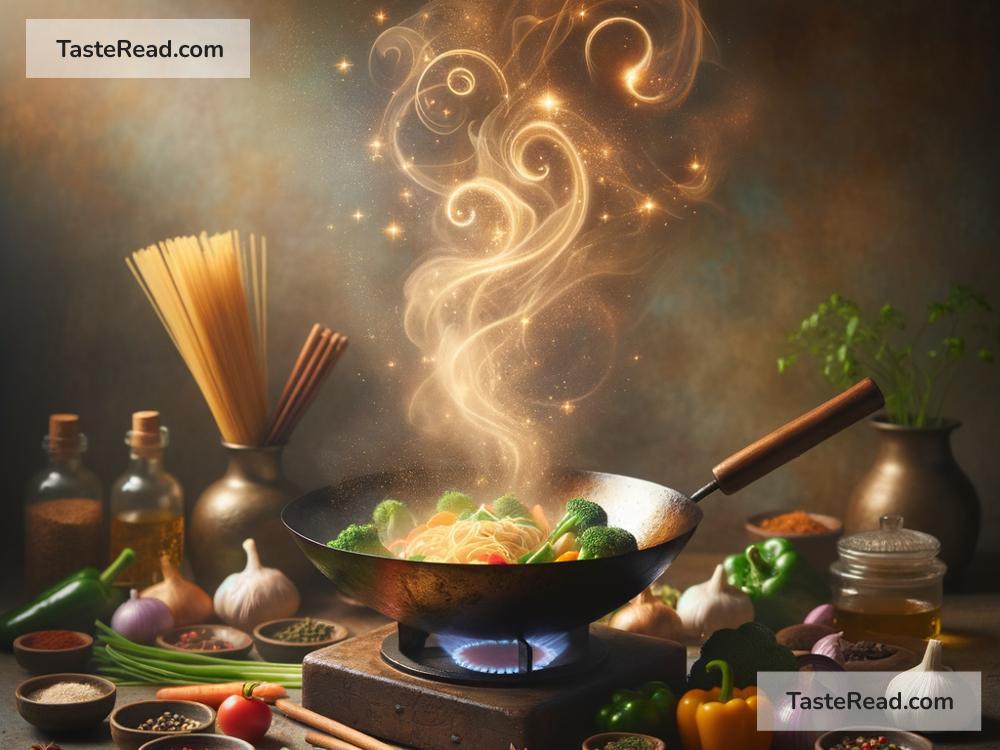The Tale of the Magical Wok
Once upon a time, in a small, quiet village surrounded by mountains and rivers, there lived a kind old woman named Mei. Mei was poor, but she had a heart full of happiness and cared deeply for her neighbors. She lived alone in a tiny house with a few pots and pans, some vegetables in her garden, and her most prized possession—a rusty old wok she had inherited from her grandmother.
The wok didn’t look special. Its edges were chipped, and its surface was scratched and worn. Nobody thought much of it. To everyone else, it looked like a regular, broken old pan. But Mei loved it. Her grandmother had always said, “This wok has more to it than meets the eye. It’s harder to see miracles when you don’t believe.” Mei didn’t quite understand what that meant, but she kept the wok close and used it every day to cook simple meals.
One summer evening, while Mei was cooking rice and vegetables in her wok, something extraordinary happened. The wok began to glow, softly at first, then brighter and brighter until the whole room seemed drenched in golden light. Mei stood there in shock, clutching her spoon as the wok suddenly shook and spoke in a warm, gentle voice.
“Dear Mei,” the wok said, “I am no ordinary cooking pan. I am a magical wok that can grant wishes. You have taken such good care of me over the years and shared so much kindness with others. It is time for me to repay you.”
Mei could hardly believe her ears. A talking, magical wok? She thought she must be dreaming. But the smell of her cooking told her she was wide awake. Gathering her courage, Mei stammered, “W-Wishes? What kind of wishes?”
“Any wish you desire,” the wok replied. “But choose wisely, for greed and selfishness can break the magic. My power is strongest when used for kindness and goodness.”
Mei didn’t have much, but she was content with what she did have. She looked down at the glowing wok and thought carefully. “I wish for enough food to share with the villagers,” she said finally. “There are so many people here who go to bed hungry. If this wok truly has magic, I want to use it to help them.”
The wok shimmered, and out of nowhere, piles of fresh vegetables, fruit, rice, and meats began pouring into Mei’s little house. It was enough to feed the entire village! Mei’s heart was bursting with joy. She quickly called her neighbors, and soon her home overflowed with laughter, chatter, and gratitude as everyone enjoyed a delicious meal.
From that day on, the magical wok became Mei’s little secret. Every evening, she would use the wok to cook hearty meals and invite the villagers to share her feast. She made soups on cold nights, savory dumplings on rainy mornings, and sweet buns for the children on sunny afternoons. Word spread quickly about Mei’s generosity, but nobody knew where all the food came from.
One evening, a traveling merchant visited the village. He was tall, dressed in fine clothes, and carried shimmering trinkets to sell. The villagers welcomed him warmly and told him about Mei’s incredible meals. Curious, the merchant offered to buy food from Mei, promising to pay her with silver coins and treasures.
Mei politely refused. “The food isn’t for sale,” she said. “It’s meant to be shared with those who need it most.”
The merchant was suspicious. “How does an old woman produce so much food night after night?” he thought. Late that night, he sneaked to Mei’s house and peeked through the window. To his amazement, he saw her wok glowing with golden light, making vegetables and rice appear like magic.
“A magical wok!” he whispered greedily. “If I had it, I’d be the richest man in the world!”
That night, while Mei slept, the merchant crept into her house and stole the wok. He ran far away, imagining all the riches that would soon be his. But when he tried to make the wok glow, nothing happened. He shouted, begged, and even demanded wishes from the wok, but it remained silent. Frustrated, he threw the wok in anger, only for it to suddenly disappear into thin air.
The magical wok found its way back to Mei’s home. It landed softly on her kitchen table, waiting to be used for kindness once again. Mei woke the next morning, surprised and overjoyed to see her wok safe and sound.
The merchant had learned an important lesson: magic is meant to be shared, not hoarded for selfish desires. He returned to the village, ashamed of what he had done, and apologized to Mei. Mei forgave him with a smile, and together, they cooked a giant feast for the villagers using the magic of the wok.
From that day forward, the villagers grew even closer, helping one another whenever they could. Mei, her magical wok, and her kind heart reminded everyone that true happiness comes from sharing what you have and caring for others.
And so, the magical wok continued to grant wishes—not for gold or jewels—but for meals that brought joy and togetherness to the village. Mei lived the rest of her days surrounded by laughter and love, forever grateful for the blessing of her magical wok.
The end.


